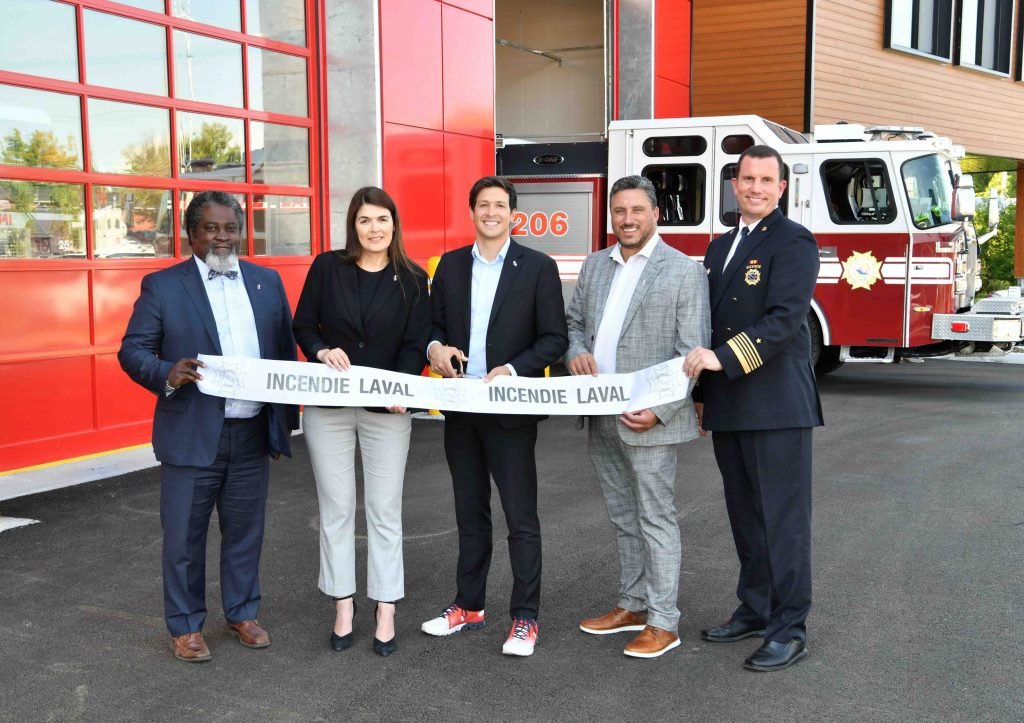The people of Laval-Ouest have a new firehall. Firehall No. 6, located at 580 Dagenais Blvd. West at the corner of 51st Ave., replaces an old aging firehall on 35th Ave. that once served the area. The new building cost $12.4 million.
According to Councillor Sandra Desmeules (Concorde–Bois-de-Boulogne), who sits on the executive-committee where she is responsible for public safety dossiers, the city decided to relocate the firehall in order to improve the fire department’s response time to fires.
“In Laval, we are already in a position to say that a minimum of 10 firefighters will be present on the scene of an emergency within 10 minutes of a distress call being received,” she said. “These numbers are more than statistics: they are a reflection of lives saved year after year.”

Here are some facts about the new firehall:
- It is currently being considered for LEED environmental construction certification;
- The garage doors have been designed higher and wider to allow access by new and larger fire trucks;
- The firehall can accommodate eight firefighters per shift;
- It has a special platform for training novice firefighters;
- A solar-power wall will provide additional electricity for various needs;
- The building’s exterior architecture has been designed so as to fit into the neighbourhood.
Councillors Cifelli and Piché ask city to recognize Quebec sign language
Action Laval opposition city councillors Isabelle Piché (Saint-François) and Achille Cifelli (Val-des-Arbres) are asking Laval city council to request that the provincial government officially recognize Quebec Sign Language used by the deaf.
An estimated 10,000 persons in Quebec use Quebec Sign Language, while more than 500 of these live in Laval. The federal government has already taken the step of recognizing Quebec Sign Language.
“In Laval, we already recognize LSQ, since our council meetings are signed directly for rebroadcasting online,” says Piché. “I am now asking my colleagues on council to send a message to Quebec.”
The last Parti Québécois government, under former Premier Pauline Marois, had initiated proceedings to recognize LSQ, although the legislation died on the order paper when elections were called.
“If this is a simple gesture for us, the municipal councillors, it is very significant for these people,” said Cifelli, referring to those who use LSQ.
Laval becomes a bee-friendly city
In an effort to add to its commitment towards biodiversity, the City of Laval says it has decided to sign onto the Bee City program.
A Bee City is a municipality or First Nations community taking action to help pollinators. The program is overseen by Pollinator Partnership Canada, which recognizes communities across Canada which take action to protect pollinators such as bees.
“Pollinators are essential to the preservation of biodiversity and contribute to the maintenance of food security,” said Laval city councillor Alexandre Warnet who is responsible for environmental and ecological dossiers.

“What’s important to keep in mind is that around 40 per cent of our food pantry depends on them, while 25 per cent of bees are threatened with extinction,” he continued. “So, we must act. I am therefore very happy to announce that Laval will be doing its part and will contribute to their protection.”
In becoming a Bee City municipality, Laval will be part of a North American network of municipalities which are being mobilized to protect pollinators.
The Bee City Canada program was launched in 2015. The City of Laval will be deciding in the near future what further actions to take in conjunction with Bee City to help pollinators here. In addition to this new commitment to help preserve bees, the City of Laval decided in 2020 to follow a program dedicated to ensuring the protection of monarch butterflies.



